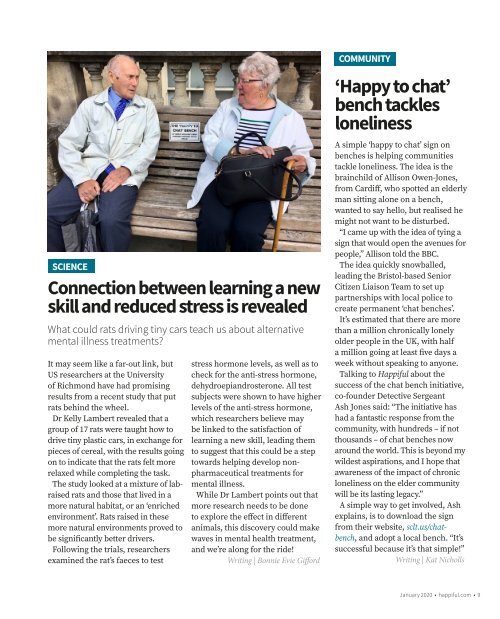Happiful January 2020
You also want an ePaper? Increase the reach of your titles
YUMPU automatically turns print PDFs into web optimized ePapers that Google loves.
SCIENCE<br />
Connection between learning a new<br />
skill and reduced stress is revealed<br />
What could rats driving tiny cars teach us about alternative<br />
mental illness treatments?<br />
It may seem like a far-out link, but<br />
US researchers at the University<br />
of Richmond have had promising<br />
results from a recent study that put<br />
rats behind the wheel.<br />
Dr Kelly Lambert revealed that a<br />
group of 17 rats were taught how to<br />
drive tiny plastic cars, in exchange for<br />
pieces of cereal, with the results going<br />
on to indicate that the rats felt more<br />
relaxed while completing the task.<br />
The study looked at a mixture of labraised<br />
rats and those that lived in a<br />
more natural habitat, or an ‘enriched<br />
environment’. Rats raised in these<br />
more natural environments proved to<br />
be significantly better drivers.<br />
Following the trials, researchers<br />
examined the rat’s faeces to test<br />
stress hormone levels, as well as to<br />
check for the anti-stress hormone,<br />
dehydroepiandrosterone. All test<br />
subjects were shown to have higher<br />
levels of the anti-stress hormone,<br />
which researchers believe may<br />
be linked to the satisfaction of<br />
learning a new skill, leading them<br />
to suggest that this could be a step<br />
towards helping develop nonpharmaceutical<br />
treatments for<br />
mental illness.<br />
While Dr Lambert points out that<br />
more research needs to be done<br />
to explore the effect in different<br />
animals, this discovery could make<br />
waves in mental health treatment,<br />
and we’re along for the ride!<br />
Writing | Bonnie Evie Gifford<br />
COMMUNITY<br />
‘Happy to chat’<br />
bench tackles<br />
loneliness<br />
A simple ‘happy to chat’ sign on<br />
benches is helping communities<br />
tackle loneliness. The idea is the<br />
brainchild of Allison Owen-Jones,<br />
from Cardiff, who spotted an elderly<br />
man sitting alone on a bench,<br />
wanted to say hello, but realised he<br />
might not want to be disturbed.<br />
“I came up with the idea of tying a<br />
sign that would open the avenues for<br />
people,” Allison told the BBC.<br />
The idea quickly snowballed,<br />
leading the Bristol-based Senior<br />
Citizen Liaison Team to set up<br />
partnerships with local police to<br />
create permanent ‘chat benches’.<br />
It’s estimated that there are more<br />
than a million chronically lonely<br />
older people in the UK, with half<br />
a million going at least five days a<br />
week without speaking to anyone.<br />
Talking to <strong>Happiful</strong> about the<br />
success of the chat bench initiative,<br />
co-founder Detective Sergeant<br />
Ash Jones said: “The initiative has<br />
had a fantastic response from the<br />
community, with hundreds – if not<br />
thousands – of chat benches now<br />
around the world. This is beyond my<br />
wildest aspirations, and I hope that<br />
awareness of the impact of chronic<br />
loneliness on the elder community<br />
will be its lasting legacy.”<br />
A simple way to get involved, Ash<br />
explains, is to download the sign<br />
from their website, sclt.us/chatbench,<br />
and adopt a local bench. “It’s<br />
successful because it’s that simple!”<br />
Writing | Kat Nicholls<br />
<strong>January</strong> <strong>2020</strong> • happiful.com • 9

















